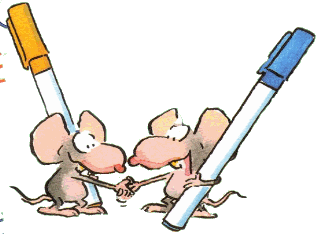
Wednesday 30 September 2020
Tuesday 29 September 2020
Monday 28 September 2020
Sunday 27 September 2020
Study Techniques:The PQ4R Method
This method takes an active approach to learning that improves memorisation and understanding of the topic. Similar to the SQ3R method above, PQ4R is an acronym that stands for the six steps in the process.
Preview: Preview the information before you start reading to get an idea of what the subject matter will be. Skim the material and read only the headers, subheadings, and highlighted text.
Preview: Preview the information before you start reading to get an idea of what the subject matter will be. Skim the material and read only the headers, subheadings, and highlighted text.
Question: Ask yourself questions related to the topic, such as, What do I expect to learn? What do I already know about this topic?
Read: Read the information one section at a time and try to identify answers to your questions.
Reflect: Did you answer all of your questions? If not, go back and see if you can find the answer.
Recite: In your own words, either speak or write down a summary of the information you just read.
Review: Look over the material one more time and answer any questions that have not yet been answered.
Friday 25 September 2020
Wednesday 23 September 2020
2020: Wyshede en waarhede
 |
Gaan maak gerus 'n draai HIER om na die interessantewyshede en waarhede te kyk. |
Tuesday 22 September 2020
It Is Better to Build Children Than to Mend Adults
Children Learn What They Live
[by Dorothy Law Nolte, Ph.D.]
If children live with criticism, they learn to condemn.
If children live with hostility, they learn to fight.
If children live with fear, they learn to be apprehensive.
If children live with pity, they learn to feel sorry for themselves.
If children live with ridicule, they learn to feel shy.
If children live with jealousy, they learn to feel envy.
If children live with shame, they learn to feel guilty.
If children live with encouragement, they learn confidence.
If children live with tolerance, they learn patience.
If children live with praise, they learn appreciation.
If children live with acceptance, they learn to love.
If children live with approval, they learn to like themselves.
If children live with recognition, they learn it is good to have a goal.
If children live with sharing, they learn generosity.
If children live with honesty, they learn truthfulness.
If children live with fairness, they learn justice.
If children live with kindness and consideration, they learn respect.
If children live with security, they learn to have faith in themselves and in those about them.
If children live with friendliness, they learn the world is a nice place in which to live.
[by Dorothy Law Nolte, Ph.D.]
If children live with criticism, they learn to condemn.
If children live with hostility, they learn to fight.
If children live with fear, they learn to be apprehensive.
If children live with pity, they learn to feel sorry for themselves.
If children live with ridicule, they learn to feel shy.
If children live with jealousy, they learn to feel envy.
If children live with shame, they learn to feel guilty.
If children live with encouragement, they learn confidence.
If children live with tolerance, they learn patience.
If children live with praise, they learn appreciation.
If children live with acceptance, they learn to love.
If children live with approval, they learn to like themselves.
If children live with recognition, they learn it is good to have a goal.
If children live with sharing, they learn generosity.
If children live with honesty, they learn truthfulness.
If children live with fairness, they learn justice.
If children live with kindness and consideration, they learn respect.
If children live with security, they learn to have faith in themselves and in those about them.
If children live with friendliness, they learn the world is a nice place in which to live.
Monday 21 September 2020
Sunday 20 September 2020
Study Techniques: Mind Mapping
If you’re a visual learner, try mind mapping, a technique that allows you to visually organise information in a diagram. First, you write a word in the centre of a blank page. From there, you write major ideas and keywords and connect them directly to the central concept. Other related ideas will continue to branch out.
The structure of a mind map is related to the way our brains store and retrieve information. Mind mapping your notes instead of just writing them down can improve your reading comprehension. It also enables you to see the big picture by communicating the hierarchy and relationships between concepts and ideas.
So, how do you do it?
The structure of a mind map is related to the way our brains store and retrieve information. Mind mapping your notes instead of just writing them down can improve your reading comprehension. It also enables you to see the big picture by communicating the hierarchy and relationships between concepts and ideas.
So, how do you do it?
Grab a blank sheet of paper (or use a tool online) and write your study topic in the centre, such as “child development.”
Connect one of your main ideas (i.e., a chapter of your book or notes) to the main topic, such as “developmental stages.”
Connect sub-branches of supporting ideas to your main branch. This is the association of ideas. For example, “Sensorimotor,” “Preoperational,” “Concrete operational,” and “Formal operational.”
TIP: Use different colours for each branch and draw pictures if it helps.
Friday 18 September 2020
Thursday 17 September 2020
Wednesday 16 September 2020
Monday 14 September 2020
Saturday 12 September 2020
2020: Wyshede en waarhede
 |
Gaan maak gerus 'n draai HIER
om na die interessante
wyshede en waarhede te kyk.
|
Friday 11 September 2020
Thursday 10 September 2020
Wednesday 9 September 2020
Tuesday 8 September 2020
Monday 7 September 2020
Sunday 6 September 2020
2020: Wyshede en waarhede
 |
Gaan maak gerus 'n draai HIER
om na die interessante
wyshede en waarhede te kyk.
|
Study Techniques: Colour-Coded Notes
Messy notes can make it hard to recall the important points of a lecture. Writing in colour is a dynamic way to organise the information you’re learning. It also helps you review and prioritise the most important ideas.
A recent study found that colour can improve a person’s memory performance. That same study found that warm colours (red and yellow) “can create a learning environment that is positive and motivating that can help learners not only to have a positive perception toward the content but also to engage and interact more with the learning materials.” It also reported that warmer colours “increase attention and elicit excitement and information.”
Writing in colour may seem like a no-brainer, but keep these tips in mind:
A recent study found that colour can improve a person’s memory performance. That same study found that warm colours (red and yellow) “can create a learning environment that is positive and motivating that can help learners not only to have a positive perception toward the content but also to engage and interact more with the learning materials.” It also reported that warmer colours “increase attention and elicit excitement and information.”
Writing in colour may seem like a no-brainer, but keep these tips in mind:
Write down key points in red.
Highlight important information in yellow.
Organise topics by colour.
Don’t colour everything—just the most important information.
Saturday 5 September 2020
Friday 4 September 2020
Thursday 3 September 2020
Wednesday 2 September 2020
Sekretaressedag ...
Baie dankie vir alles wat julle doen - die agter-die-gordyn-dinge is baie meer en uitputtend, as dit waarvan ons weet. Julle is sterre!!!
Tuesday 1 September 2020
Afrikaans - webwerwe tot jou voordeel
Besoek gerus hierdie webwerwe indien jy so 'n bietjie ekstra kennis wil bymekaar maak. Daar is ook makliker webwerwe vir mense wat sukkel. En dan is daar webwerwe vir hulle wat op soek is na nog vraestelle om uit te werk. Viva, die internet!!
https://www.afrikaans.us/afrikaans/home-afrikaans/
https://www.afrikaans.us/afrikaans/home-afrikaans/
Subscribe to:
Posts (Atom)





























